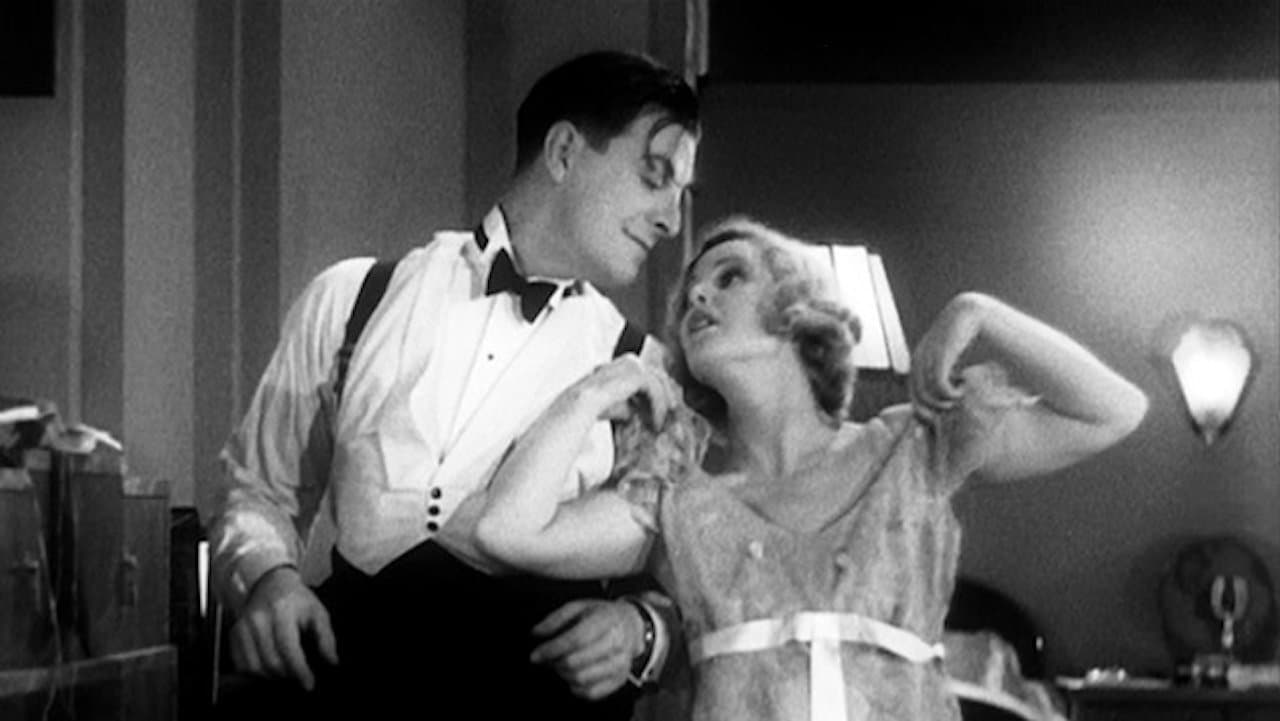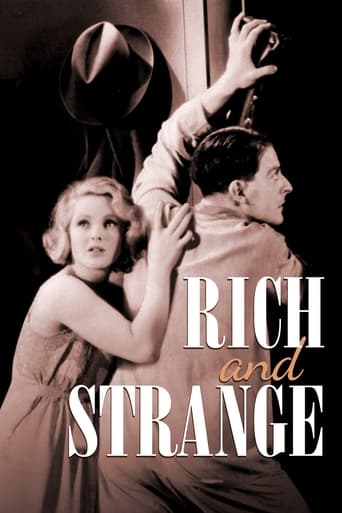



The greatest movie ever made..!
Let's be realistic.
The performances transcend the film's tropes, grounding it in characters that feel more complete than this subgenre often produces.
View MoreGood films always raise compelling questions, whether the format is fiction or documentary fact.
View MoreIf you're not a fan of Hitchcock's then you probably will not get much out of this. It's an average very old movie on the surface, that seems like it was supposed to be a silent film with some talking elements they tried to add after this movie was well along the way to being produced. So it is clumsy with old equipment used, bad sound. But there are those HItchcock touches you just can't miss that elevates this to a must see if you want to understand the master's earlier work and later classics.
View MoreHitchcock's 1931 Rich And Strange is an odd little film, based on a popular novel. A British couple come into an inheritance, go on a cruise, have affairs, then after a boat sinking, are rescued and re-united.This is a theme that has been used many times in film history. Bored couple sow wild oats, but find "there's no place like home." Pretty basic stuff. The odd thing here is that the husband Fred, played by Henry Kendall, is so unsympathetic, such an unfeeling, selfish cad, that the devotion of his wife Emily, played by Joan Barry, is unbelievable. One almost thinks her dim to throw away her on board older Romeo, Gordon (Percy Marmont), to remain with Fred, who is taken by a gold-digging false "Princess (Betty Amman) to the tune of 1,000 pounds.The film is much more of an early sound film (title cards, sound effects, score) than Hitch's three prior films (JUNO, MURDER!, SKIN GAME) and almost looks like a 1929 effort than one from 1931. These early sound moments are shuffled with the dialogue sequences.There are the usual cinematic and editing moments from Hitch: an opening montage of workers ending their day and heading home on the Underground; a joke about a misbehaving umbrella, ditto newspaper; a close up track shot of text; quick edit montages of sight seeing in Paris; point of view shots; a veiled kiss gone wrong; the couple dead drunk careening to their rooms; a two shot of the wife seen in the mirror of a make-up case, also containing a close-up of the Princess; the two couples in parallel rickshaws; a love letter blurred by point of view tears; menu items leaping out at the audience, etc.The time is given on IMDb as both 81 minutes and 83 minutes. My print ran 1:22:35.Since we are un-engaged with the couple as played, we never really get into the story or care what happens to them. It moves along briskly and is basically well directed, photographed and edited. It's just that the narrative and the players are of little interest.
View MoreAn expectation cast by the later half of Hitchcock's oeuvre may not do justice to "Rich and Strange" (1931), but when seen in the context of Hitchcock's early sound films it really sticks out for the better. In fact, I would say it is the best of them. In addition to critical treatises on marriage, gender and sexuality, Hitchcock studies one of his favorite themes of a man who yearns for something different and thus practically invites chaos to his life which otherwise would be in perfect order. This perfect order of harmonious dimensions is portrayed in the opening dolly shot of the protagonist's dull office life. Then, however, we see that he doesn't quite fit this seeming order, revealing distress beneath, as he cannot open up his umbrella with the others. The story begins when he and his wife, bored with their mundane life, hear of an early inheritance which leads them to a trip round the world. Unlike in "The 39 Steps" (1935) or "Saboteur" (1942), here the abundance of settings doesn't equal exciting adventure, although quite a fast pace, but a fragmentary episode-like structure and a ground for the theme of alienation. These may be among the reasons why "Rich and Strange" was back in the day so poorly received, but, nonetheless, has later been commended by several critics (Truffaut, Spoto) as well as favored by the master himself. In the essence of the film's moral (which may be a word too puny for Hitchcock's level of mastery) is that the main couple yearn for excitement and adventure, but instead of enriching, life-enhancing experiences, go through severe disillusionment. This disillusionment, however, doesn't affect their life for better or worse. It remains the same. Donald Spoto has written that it is in these moments of disillusionment where lies the main point of the film: the acceptance for the extremes of life and death as they are. In comparison to "The Skin Game" (1931), which Hitchcock made just before this, "Rich and Strange" is much more original and cinematic. The same happened with "Murder!" (1930) which is far more superior than its theatrical predecessor "Juno and the Paycock" (1929). But what really makes "Rich and Strange" so special, and a fascinating part of Hitchcock's oeuvre, is its absurdity. This absurdity is not only gained from story nor humor but, above all, from their odd execution. The absurdity emerges from the film's unique, strange atmosphere. This atmosphere must be experienced to be understood and it is eternally guarded by the magical aura of the film given to it by early sound cinema.
View MoreI saw this movie under the title "Rich and Strange" and the last word certainly describes the movie.Fred and Emily are a couple like most of us. Despite working all day, they never seem to be able to get ahead. They eat frugally and Emily makes her own clothes from patterns with cheap cloth.Suddenly, out of the blue, a wealthy uncle (I wish I had a wealthy uncle out of the blue) decides not to make Fred and Emily wait until he dies. He gives them enough money to travel the world and, for a time, break Fred out of the dreary office routine (rich uncle, where are you?).First, they go to Paris, where they live the high life. Then they ship off on a long cruise.Fred is not a good sailor, and this leads to some excellent touches in the first half. While Emily enjoys herself on board, Hitchcock makes unexpected, and hilarious, jump-cuts to Fred ill in bed. A great moment in early Hitchcock is when the terribly seasick Fred is presented with the ship's menu. It lasts only a few seconds, but it's worth the wait.The tension (in the movie and between Fred and Emily) builds when Emily meets a "Commander" who is smitten with her. Again, Hitchcock's humor shines through. The Commander always seems at a loss for words and Emily is forever interrupting him. Eventually she compliments him by telling him he's easy to talk to. After Fred finds his sea legs, he meets a Princess inexplicably smitten with him -- or is it his money? Fred's romance with the Princess is the silly side of infidelity; but when Emily begins returning the Commander's affection, it looks like coming into money destroyed Fred and Emily's marriage.One charm of "Rich and Strange" is that, though it's a talkie all the way through, Hitchcock has inserted titles between the scenes, as in the silent movie days, making a droll running commentary on Fred and Emily's new life.The problem is, about the half-way mark, "Rich and Strange" (sometimes going under the romantic alias "East of Shanghai") feels like it's stretching out. I don't know if Hitchcock got bored with it, but I certainly did. When Fred and Emily were stranded alone on a sinking ship I hoped they would go down with it. But even at that point, I had a lot of movie to go.Hitchcock made few straight comedies. "Mr. and Mrs. Smith" (1941) is another wry take on marriage benefiting from the considerable talents of Carole Lombard and Robert Montgomery. The under-appreciated "The Trouble with Harry" is a romantic comedy with couples brought together by an inconveniently dead body. Despite having a great sense of humor that followed Hitchcock through his television show and right up to his last movie ("Family Plot"), his comedies (even "Harry") have soggy bottoms. Hitchcock is really at the top of his game when his dark comic sensibility creeps into movies of almost unbearable suspense. When "Rich and Strange" begins to sound melodramatic, I had a sense Hitchcock felt (pardon the pun) all at sea.Nevertheless, for a Hitchcock completist, this film is a must. It has wonderful touches here and there.
View More